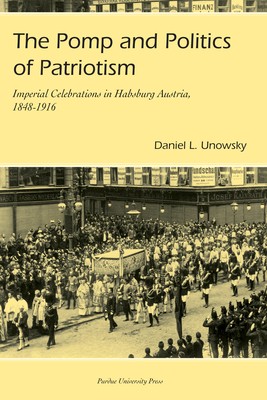
- We will send in 10–14 business days.
- Author: Daniel Unowsky
- Publisher: Purdue University Press
- Year: 2006
- Pages: 263
- ISBN-10: 1557534004
- ISBN-13: 9781557534002
- Format: 16.5 x 22.8 x 1.8 cm, minkšti viršeliai
- Language: English
- SAVE -10% with code: EXTRA
Reviews
Description
This book examines the promotion and reception of the image of Franz Joseph (Habsburg emperor from 1848 to 1916) as a symbol of common identity in the Austrian half of the Habsburg Monarchy (Cisleithania). In the second half of the nineteenth century and the first decades of the twentieth century the promotion of the cult of the emperor encouraged a Cisleithania-wide culture of imperial celebration. On Franz Joseph's birthdays and jubilees, cities produced special theater productions, torchlight parades, and ethnic/historical processions. Thousands of voluntary associations sponsored local festivities. Hundreds of thousands of villagers and townspeople set transparent portraits of Franz Joseph in illuminated windows. Publishers sold millions of commemorative books and pamphlets, and retailers offered busts, plaques, and mass-produced portraits of the emperor. The ability of the center to control the meaning of Habsburg patriotism was limited, however. This study concentrates on the official presentation of the imperial cult as well as on the use or rejection of the image of the emperor by regional social and nationalist factions. It analyzes both the production of the cult of the emperor and its reception, illuminating the tension between national and supra-national identity in an age of expanding political participation.
EXTRA 10 % discount with code: EXTRA
The promotion ends in 21d.19:08:36
The discount code is valid when purchasing from 10 €. Discounts do not stack.
- Author: Daniel Unowsky
- Publisher: Purdue University Press
- Year: 2006
- Pages: 263
- ISBN-10: 1557534004
- ISBN-13: 9781557534002
- Format: 16.5 x 22.8 x 1.8 cm, minkšti viršeliai
- Language: English English
This book examines the promotion and reception of the image of Franz Joseph (Habsburg emperor from 1848 to 1916) as a symbol of common identity in the Austrian half of the Habsburg Monarchy (Cisleithania). In the second half of the nineteenth century and the first decades of the twentieth century the promotion of the cult of the emperor encouraged a Cisleithania-wide culture of imperial celebration. On Franz Joseph's birthdays and jubilees, cities produced special theater productions, torchlight parades, and ethnic/historical processions. Thousands of voluntary associations sponsored local festivities. Hundreds of thousands of villagers and townspeople set transparent portraits of Franz Joseph in illuminated windows. Publishers sold millions of commemorative books and pamphlets, and retailers offered busts, plaques, and mass-produced portraits of the emperor. The ability of the center to control the meaning of Habsburg patriotism was limited, however. This study concentrates on the official presentation of the imperial cult as well as on the use or rejection of the image of the emperor by regional social and nationalist factions. It analyzes both the production of the cult of the emperor and its reception, illuminating the tension between national and supra-national identity in an age of expanding political participation.


Reviews